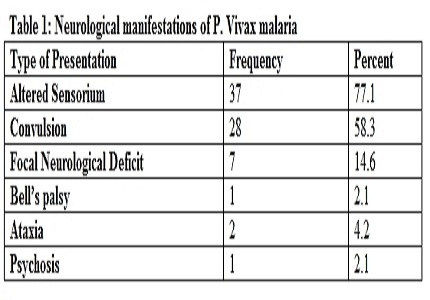Outcome analysis of patients presenting with neurological manifestations of Plasmodium Vivax malaria in tertiary care hospital of Mumbai.
Abstract
Objective: Plasmodium vivax (P. vivax) infection has been considered for a long time a benign and self-limited disease. Percentage of complicated cases of vivax malaria is on the increasing trend, cerebral malaria being the most dreaded and a potentially life-threatening complication.
Material and Methods: A prospective observational study was done after institutional ethics committee approval from July 2011 to February 2012 at tertiary care hospital in Mumbai. We studied the clinical profile and outcome of all the 48 patients above the age of 12 years diagnosed with Cerebral Malaria.
Results: Incidence of neurological manifestations of vivax malaria in our hospital was 14.15%, with 32(66.7%) out of 48 patients being males. The mean age of patients with neurological manifestations of vivax malaria was 29.66 years in discharged patients and 50.88 years in expired patients. Altered sensorium 37(77.1%) followed by convulsion 28(58.3%) were common findings, but focal neurological deficit, Bell’s palsy, ataxia, psychosis were also seen. Mortality was higher (62.5%) in patients with premorbid conditions (p value <0.05) and that of with other system involvements (87.5%) including hepatic, renal, hepatorenal, pulmonary involvement (p value<0.05). Association between outcome with older age & high parasite index patients is significant (p value<0.001), however no such significant association was found in terms of gender distribution.
Conclusion: Plasmodium vivax, as has been traditionally believed, is no longer a benign species and is causing presentations akin to P. falciparum. It is imperative that clinicians are aware of and ready to handle the complications caused by Plasmodium vivax.
Downloads
References
Sina B. Focus on Plasmodium vivax. Trends in parasitology. 2002 Jul 1; 18(7):287-9.
Is Plasmodium vivax still a paradigm for uncomplicated malaria? Picot S. Med Mal Infect. 2006 Aug;36(8):406-13.
Garg RK, Karak B, Misra S. Neurological manifestations of malaria: an update. Neurology India. 1999 Apr 1; 47(2):85.
Limaye CS, Londhey VA, Nabar ST. The study of complications of vivax malaria in comparison with falciparum malaria in Mumbai. J Assoc Physicians India. 2012 Oct; 60(60):15-8.
Muddaiah M, Prakash PS. A study of clinical profile of malaria in a tertiary referral centre in South Canara. Journal of vector borne diseases. 2006 Mar 29; 43(1):29.
Dondorp AM, Lee SJ, Faiz MA, Mishra S,Price R, Tjitra E, Than M, Htut Y, Mohanty S, Yunus EB, Rahman R . The Relationship between age and the manifestations of and mortality associated with severe malaria; Clinical Infectious Diseases 2008 Jul 15:47(2):151-7.
Nadkar MY, Huchche AM, Singh R, Pazare AR. Clinical profile of severe Plasmodium vivax malaria in a tertiary care centre in Mumbai from June 2010-January 2011. J Assoc Physicians India. 2012 Oct; 60:11-3.
Kumar A, Valecha N, Jain T, Dash AP. Burden of malaria in India: retrospective and prospective view. The American journal of tropical medicine and hygiene. 2007 Dec 1; 77(6 Suppl):69-78.
Sarkar S, Bhattacharya P. Cerebral malaria caused by Plasmodium vivax in adult subjects. Indian Journal of Critical Care Medicine. 2008 Oct 1; 12(4):204.
Roman GC, Senanayake N. Neurological manifestation of malaria. Arquivos de neuro-psiquiatria. 1992 Mar; 50(1):03-9.
Anderson M. Managemnt of cerebral infection. Journal of Neurology, Neurosurgery & Psychiatry.1993 Dec 1; 56(12):1243-58.
Shaikh QH, Ahmad SM, Abbasi A, Malik SA, Sahito AA, Munir SM. Thrombocytopenia in malaria. J Coll Physicians Surg Pak. 2009 Nov; 19(11):708-10.
Patel P, Patel M, Gamit B, Modi J, Kevadiya S, Padsala S. Thrombocytopenia in malaria: Correlation with various prevalent species.2013.
Kochar DK, Saxena V, Singh N, Kochar SK, Kumar SV, Das A. Plasmodium vivax malaria. Emerg Infect Dis. 2005 Jan 1; 11(1):132-4.
Prakash J, Singh AK, Kumar NS, Saxena RK. Acute renal failure in Plasmodium vivax malaria. Journal-Association of Physicians of India. 2003 Mar 1; 51:265-7.
Kulkarni VK, Agrawal K. A study of clinical profile of malaria with special reference to complications and outcome. Int J Adv Med 2017; 4:317-22.



 OAI - Open Archives Initiative
OAI - Open Archives Initiative


